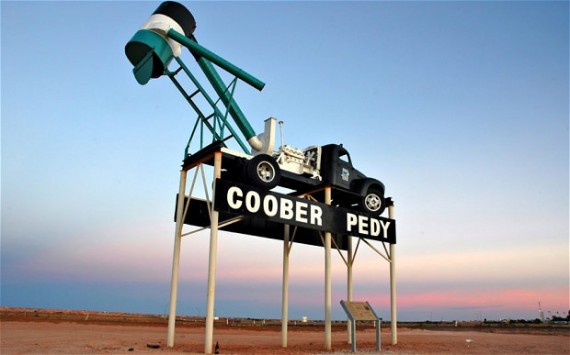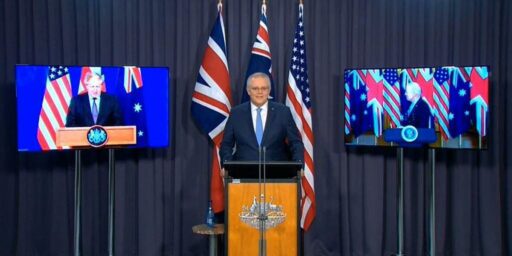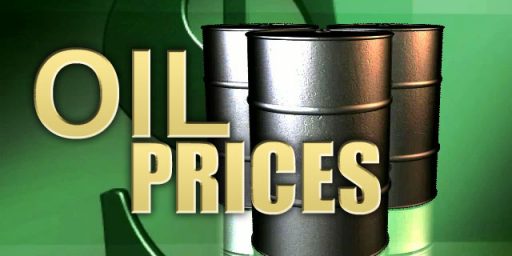Massive Oil Discovery Puts Outback Town on World Energy Map
Will this new Australian oil discovery shake up world politics?
An enormous oil discovery in the remote Austrlian outback town of Coober Pedy is producing quite a stir:
The discovery in central Australia was reported by Linc Energy to the stock exchange and was based on two consultants reports, though it is not yet known how commercially viable it will be to access the oil.
The reports estimated the company’s 16 million acres of land in the Arckaringa Basin in South Australia contain between 133 billion and 233 billion barrels of shale oil trapped in the region’s rocks.
It is likely however that just 3.5 billion barrels, worth almost $359 billion (£227 billion) at today’s oil price, will be able to be recovered.
The find was likened to the Bakken and Eagle Ford shale oil projects in the US, which have resulted in massive outflows and have led to predictions that the US could overtake Saudi Arabia as the world’s largest oil producer as soon as this year.
How large is the find? If it’s as huge as is being reported and commercially viable, Australia would have more oil than Iran, Iraq, Canada, or Venezuela. It would become one of the top three oil producers.
There are some proclaiming that this discovery will have enormous geopolitical consequences, that, in particular, it will push Saudi Arabia from its present perch. I think that’s grossly premature.
Saudi Arabia’s importance as an oil producer does not stem merely from the size of its reserves. It’s the size of the reserves, the high quality of the oil (and consequent ease of refining), and position as lowest cost producer. It’s estimated that a barrel of Saudi crude costs less than $20 to produce. That’s half as much as a gallon of on-shore U. S. oil, a third of the cost of a barrel of off-shore U. S. oil, half the price of a barrel of South American oil, and a third of the cost of a barrel of African oil. That’s what gives the KSA the power to set world oil prices.
When we know more about the quality and total upstream costs of pumping oil from this newly discovered Australian field, we’ll be able to start thinking about geopolitical impact. But there must be a lot of nervous leaders in Middle Eastern countries about now. There is such a thing as a stability premium.







This is pretty arid country so my first question would be where are they going to get the enormous quantities of water necessary for fracking?
I await the emergence of Alqaedaroo
@Ron Beasley: This is pretty arid country so my first question would be where are they going to get the enormous quantities of water necessary for fracking?
Foster’s. It’s Australian for fracking good beer.
@Ron Beasley:
Well, they are going to need a pipeline to get to the oil out, just lay another to bring the water in.
Plus, fracking in the desert will accelerate the innovation in reducing water use for fracking already underway.
Meanwhile the Koch brothers spilt 17,000 gallons from one of their pipelines in Texas…and Arctic temps are at a 40,000 year high.
But yeah….drill baby drill.
Because the same folks who rant about passing on an imaginary debt crisis to the next generation…don’t really care if we pass on a f ‘ed up planet to them.
Ignoramuses.
@JKB: There are a couple of problems with this. The first is that Coober Pedy is a really long way from any reliable source of water. The infrastructure required would increase the price and decrease the EROEI making the oil uneconomical. The second problem is that the Australian continent is a very arid one. Water used for fracking would not be used for things like growing food, feeding livestock and supplying water to homes and businesses.
@Ron Beasley: I’m not sure 200 miles to the ocean is that long of a way and fracking can use brackish water unfit for personal consumption.
@Ron Beasley: A question from true ignorance: Why not salt water? Would they have to desalinate it? Why?
@PD Shaw: You beat Ron to it. Any thing to add Ron?
The problem with the new fields is getting the oil out and into the world market. This is a problem in the US in places like ND. It is a problem on steroids for Australia.
For decades as the traditional US fields on the mainland had been in permanent decline, the new oil was coming from the Gulf or overseas. The refiners moved to the gulf, pipelines that use to move crude were converted to carry fiber optics.
Now with new fields being discovered in places that never had any infrastructure and old fields getting a second life, we are having to build and renew a bunch of infrastructure. This is why you are seeing all the huge oil trains. If you dont have pipelines, you have to use trains to move the oil.
And we have to do that even when we have a large amount of existing infrastructure and a long history of big oil.
Australia has NO existing infrastructure. No pipelines or rail lines, no refiners (beyond what they need for local consumption), no export facilities for tankers, no water. Their local experience with energy is off shore and relatively small. Every thing, including a lot of the knowledge, will have to be imported.
They will get the oil out but it will not be soon. And it will not be cheap. I am not sure $100 oil will pay for this. They may need more. Oil biz is like the movie biz, you spend all your money up front and then get paid over time. There is a lot of capital that will be needed to build this out. And it will take time. You wont be putting outback oil into your car for a while. And expect to pay a nice price for it when you do.
@OzarkHillbilly: Yes, you can use salt water. The Saudi’s use salt water to maintain pressure in their old fields. Of course, their fields are close to salt water.
@Ron Beasley: Third problem is that it may not be economically viable to build a pipeline just yet, at least not until the find is proven, which means they’ll have to start fracking first. It’s not Sim City, after all.
@jib10: Australia is the world’s largest exporter of coal so clearly they have rail lines, ships and ports. I don’t see the issue as infrastructure but rather cost of production.
@OzarkHillbilly: 200 miles is still a lot of infrastructure and the price of oil will have to increase to make it economical. I must admit I don’t really know how using salt water will impact the fracking operation – how will the other chemicals used in fracking react with salt water? We have never used salt water in fracking before. Salt water is very corrosive so maintaining the pipeline would be an issue.
@jib10:
The question was more, can you use salt water for fracking? I don’t see why not with all the other chemicals they put into it but then again maybe the salt makes for problems? I don’t think Ron is a petroleum engineer but he is an engineer and may have heard or read something. Or not.
@Ron Beasley: Thanx Ron. I don’t see 200 miles as that big a deal (see Keystone and Alaska pipelines). But the corrosiveness of salt water is something I had not thought of. That could be a real issue.
@Scott:
1) Oil is not coal. There is a huge difference between mining and oil. The tech is totally different, the equipment is totally different. In one case your moving bulk earth, in another your moving caustic liquids under high pressure. Completely different engineering. Just one example, you use conveyor belts to move coal onto ships and you store the coal at the port in huge piles. Try doing that with oil. Bottom line, the industries dont mix.
2) Where the infrastructure is matters. We have tons of pipeline in the US but we dont have any in the new fields like the Bakken. So the oil sits until we load it onto trains. And we have train lines in ND, they dont have any in the outback.
Part of the problem is that there is shortage of pipe lines world wide. Pipeline welders are high skilled and highly trained and highly paid. They are in short supply right now and it takes time, years, to train new ones. Pipe is in short supply. That supply can be made up but to add capacity will take time, again years. This will happen but it will not happen fast (or cheap).
@Ron Beasley: Thats not right. They have and do use salt water in fracking. They use it all the time off shore. You dont think those offshore fracking vessels are carrying fresh water to the platforms do you?
@OzarkHillbilly: My dad was a mechanical engineer in the oil services biz. He started designing and building frack equipment in the 60’s. In his day, he designed and built some of the largest off shore oil fracking vessels in the world (this was 30 years ago, some of them are still running). There is no way that would have worked if they could not use salt water to frack.
FWIW, I sometimes get the feeling that people think fracking is new. The first oil well was fracked in Oklahoma in 1948. Fracking is old tech, it has been standard part of oil services for over 60 years. It is the vastly improved directional drilling that has changed the oil game.
Ummmm…can I say something here? I’ve actually been to Coober Pedy. It’s the opal capital of the world, which means that you walk 15 meters outside the town (which by itself looks like something from a U.S. western, with the false fronts) and you fall into a deserted mining shaft. Any oil development would have to co-exist with the opal miners, who are an extremely independent lot, (Aussies to the max) and who live off beer.
There is very little water available, and what exists requires treatment before use.
Coober Pedy is out in the middle of nowhere. Really, really, NOWHERE. It’s on the Trans-Australian highway, which means yes, there is a paved road in and out of town. Nowhere else. Any agriculturally viable area near Cooper Pedy will be inside a cattle ranch. (We were visiting a cattle ranch that was the size of Belgium. Population: 28 people.)
Take a look at a map of Australia. Take a look at where Coober Pedy is.
We’re talking about laying a pipeline 200 to 300 miles across land that has almost no infrastructure (1 highway from north to south across the Outback is all they’ve got) and is very fragile, environmentally. Maybe like going from the top part of Texas down to the very bottom. But across a Texas with no cities, no roads, no gas-stands, no stores, no houses–absolutely NOTHING. Any development would have to bring in everything they needed–including all the water.
I’d be really happy about salt-water intrusion in my well water. But as long as the fossil fuel industry is happy, I suppose.
@jib10: I wasn’t aware that we were fracking offshore and I don’t think we are.
@Ron Beasley: “Water used for fracking would not be used for things like growing food, feeding livestock and supplying water to homes and businesses. ”
To say nothing of Australia’s most pressing need for water these days — to keep the whole continent from burning down.
@C. Clavin: Meanwhile… you continue to be a worthless whining git. Did a Koch brother piss in your Cheerios or something?
@grumpy realist: Just wondering, after looking at the map you thoughtfully produced, what the heck were you doing there?
@Ron Beasley: Yes we are. We have been for decades. My dad spent months offshore when I was a kid on the fracking vessels he designed and built.
Again, fracking is not new. It is a standard part of oil field services and has been for over 60 years. Almost all wells get fracked at some point, the big producers do and certainly the big platforms do.
All wells go into decline as the pressure drops from pumping. Fracking increase the production for declining wells by making it easier for oil to flow at the low pressure. It is a standard part of well maintenance.
For the tight sands the problem is that the oil can not move very far through the sands even under high pressure. The directional drilling lets us run right down the middle of the layer containing oil, instead of poking oils through it. Then fracking lets more of the oil flow. You have to frack the tight sands right from the beginning so we do more it it now than we use to do it. But we have been doing it every where for a long time.
@grumpy realist:
I have to disagree here, the Google StreetView car has visited, so it can’t be NOWHERE. 😉
Now, a place like Eromanga, that’s nowhere… 🙂
@Ron Beasley: “This is pretty arid country so my first question would be where are they going to get the enormous quantities of water necessary for fracking? ”
Curse you! I was just about to point that out!
Seems like an important piece of the puzzle.
@ Jenos…
Didn’t you mean to type:
But, but, but….BenGHaziiiii!!!!!!
@C. Clavin: I think Australia might have more oil than Benghazi. But I’d have to check.
@C. Clavin:
Aren’t they all supposed to get raptured by then anyway?
gVOR08…
I’m not sure how exactly that particular superstition goes, actually.
I do know that Michelle Bachmann…premiere Republican thinker…thinks it’s going to happen any day now.
So yes, you may be right.
@Ron Beasley: I want to be clear, I am not defending fracking. The problems people are reporting are real. I know because they are the same things I have heard growing up around oil fields (well, except the earthquakes, I have never heard of that…).
But it is not fracking per se. Fracking is done way below the water table. The problem is that to get to the oil, you have to drill through the water table and if you mess that up and do not seal the hole properly anything you pump into or out of the well will get into the water table. Most the time this does not happen (why would you want your valuable oil leaking into the water table?). But it does happen, often enough that any one who lives around an oil field has heard the stories of polluted water and natural gas coming out of the water pipes.
Is it worse now? Maybe. The frack jobs are bigger in the new fields so more junk is pumped into the well. The water table in Ohio, Penn and NY is larger and well communicated meaning it spreads the contamination farther. And there are more people living in the area.
So it may be a bigger deal but it is not really fracking. It is drilling that is the problem. If you drill enough, at some point some one will mess up and you are going to get contaminated water tables . But it is not a new thing, it has always been that way.
@wr: My visit to Coober Pedy was in order to get a ride via the Mail Run (once a week) to drive out to a cattle ranch 100 miles away which was where our camel safari was to start.
Everyone had laughed at me when I had asked about bringing an umbrella because that entire part of the Outback was going through a 2-year drought at the time. Guess what happened? Yup–I’m a rain goddess. One year’s worth of rain came down in one week. Which stranded everyone, because there really is only one paved road (the north-south highway) and everything else turns into the stickiest mud you ever did see. The rain wasn’t all in one bunch, either. The first few days were ok, then we started getting hit. We’d have a day of rain, next day would be nice and we’d get further on the trek, then more rain would strand us again, etc. Even if we had managed to get back to the cattle station we were still 100 miles away from the nearest paved road.
Then we started running out of food and they had to airlift a food drop in to us….
Interesting times.
@grumpy realist: Sounds wild. Was it fun?
Coober Pedy… wait, isn’t that the town that’s built underground? As in, directly carved into the stone? Wouldn’t that be a concern with the fracking nearby; I’m not an expert by any means, but wouldn’t connection between fracking and geological instability be an issue when a cave-in would take out not just the homes but the whole town?
@wr: Oh, indeedy. Camels are great to hang around–they’re like huge walking stress sponges. Which I definitely needed at that point in time.
It’s also the first time I’ve been met at the airport by a bunch of reporters. The rains had hit a Saudi Arabia-sized chunk of Oz and had stranded many, many groups. I guess that as a camel safari, we were the most colourful. I got written up as a “Japanese international project manager” which amused me highly.
So…did you bring the umbrella
@C. Clavin: not on the trek, and boy was that a mistake.
Here’s a shot of the main street of Coober Pedy. There ain’t much there.
That’s funny, I thought that Priscilla, Queen of the Desert had all ready put them on the map.
http://en.wikipedia.org/wiki/The_Adventures_of_Priscilla,_Queen_of_the_Desert
@Ron Beasley:
Australia has a lot of underground water.
http://www.environment.gov.au/topics/water/water-our-environment/great-artesian-basin
I think the Chinese will see to it that oil source is developed, if they can. Break even, or even at a loss.
@dazedandconfused: So they are going to use what amounts to fossil water to get a few years worth of fossil fuel. Why does this make sense?
@Ron Beasley:
Oh, I’m just contributing the information that Australia has incredible reserves of water, and China is very interested in diversifying their sources for oil. Making “sense” of the world is way above my pay grade.
I can’t even figure out gold. How would I explain why we go to enormous lengths and environmental destruction to dig it up and then bury it in vaults again?
A shrug.